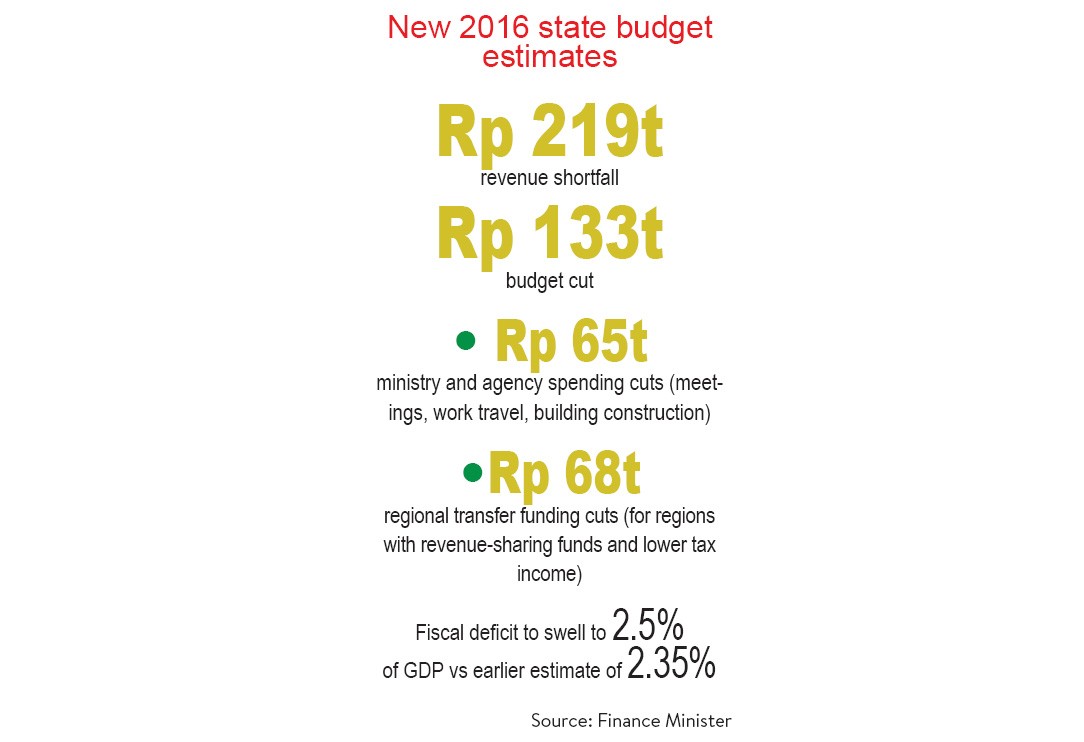Popular Reads
Top Results
Can't find what you're looking for?
View all search resultsPopular Reads
Top Results
Can't find what you're looking for?
View all search resultsGovt to cut budget again
Change text size
Gift Premium Articles
to Anyone
F
urther budget cuts are a bitter pill the government will have to swallow as it seeks to maintain the budget in a healthy state for the rest of the year.
Not tight enough, that is what seems to be on the government’s mind when it comes to this year’s state budget. One month after revising the 2016 state budget, the government is planning to implement more austerity measures to cope with the higher-than-predicted budget shortfall, especially stemming from low taxation revenues.
The revenue shortfall is projected to surge to Rp 219 trillion (US$16.7 billion) from the previous estimate of Rp 190 trillion, and several options were already on the table, said newly appointed Finance Minister Sri Mulyani Indrawati.
“We have to adjust [the state] spending, so that the deficit is kept at a level that will not trigger trust issues regarding the state budget,” she said on Wednesday.
The government has decided to further slash its spending by Rp 133.8 trillion. As much as Rp 65 trillion will be taken from ministerial and agency spending and Rp 68.8 trillion from the regional transfer funds.
The spending cut to be faced by ministries and agencies is deeper than the Rp 16.3 trillion cut in the June revision. With the additional reduction, the ministries and agencies will be left with Rp 702.8 trillion in spending allocation from the initially planned Rp 767.8 trillion.
Sri Mulyani attributed the larger shortfall projection to macroeconomic calculations in the revised budget that were “too high” and “did not reflect the reality of the economic situation”.
Low commodity prices and a decrease in trade activities as a result of the sluggish global economy are among the factors hindering state revenue collection.
As a result of the unrealistic budgetary calculations, the budget deficit had already reached Rp 230.7 trillion by the end of June, equal to 1.83 percent of the whole budget, whereas the government had set 2.35 percent as the deficit limit in the revision.
With the new estimated shortfall, the government is now braced for the deficit to widen to 2.5 percent, which is, however, still below the 3 percent limit stipulated by law.
Consequently, the former World Bank managing director said the best course of action would be to cut spending on activities that were not a priority, including business meetings, working trips and the construction of government buildings.
The Finance Ministry will also cooperate with the Office of the Coordinating Economic Minister and the National Development Agency (Bappenas) to explore other efficiency measures to be implemented to allow for appropriate spending on infrastructure, education and health.
As for the rest, the government will maintain a growth-supportive state budget that is still accurate in spending and revenues so that it can build public confidence in the country’s economy, she said.
“The President has agreed to this and we will start implementing [the cuts],” Sri Mulyani asserted.
However, as with all actions, the move will have consequences. Economists said the austerity policy would affect this year’s economic growth, especially if the government’s capital expenditure fell victim to the cuts as well.
Lower capital expenditure would have a deeper adverse effect on economic growth as such expenditure usually triggered other economic activities, said Bank Central Asia (BCA) economist David Sumual.
Samuel Asset Management economist Lana Soelistianingsih expressed a similar view, saying the spending cuts and wider deficit estimate were logical because the taxation revenue shortfall was “inevitable amid a slow economy”.
The implementation of the Tax Amnesty Law — previously expected to salvage the budget — does not seem to be helpful because it has attracted less interest than expected.
The government is aiming to collect Rp 165 trillion from penalties under the amnesty program. However, as of July 31, income from penalties only stood at Rp 84.46 billion, a tiny 0.05 percent of the target.
“There will be impacts on economic growth, but I think we can still accept it if the economy grows by 4.9 percent to 5 percent,” Lana said.
____________________________
To receive comprehensive and earlier access to The Jakarta Post print edition, please subscribe to our epaper through iOS' iTunes, Android's Google Play, Blackberry World or Microsoft's Windows Store. Subscription includes free daily editions of The Nation, The Star Malaysia, the Philippine Daily Inquirer and Asia News.
For print subscription, please contact our call center at (+6221) 5360014 or subscription@thejakartapost.com










